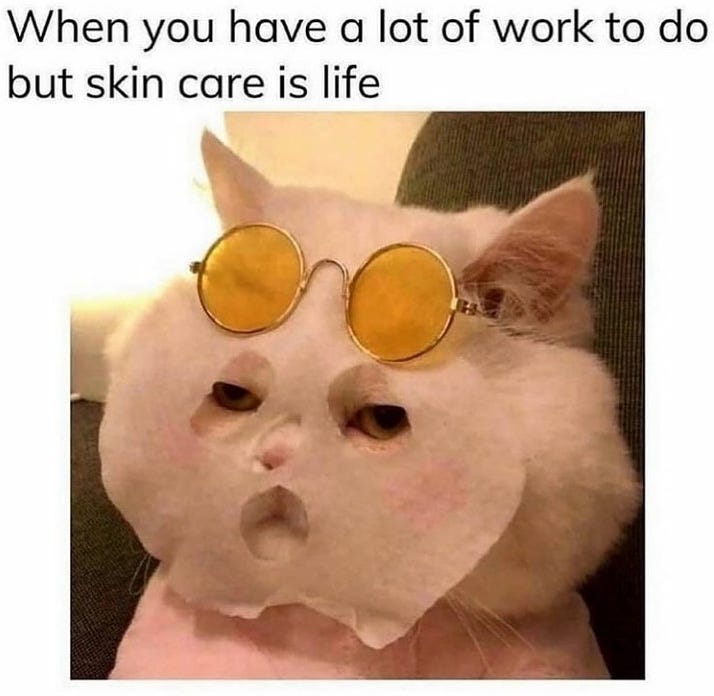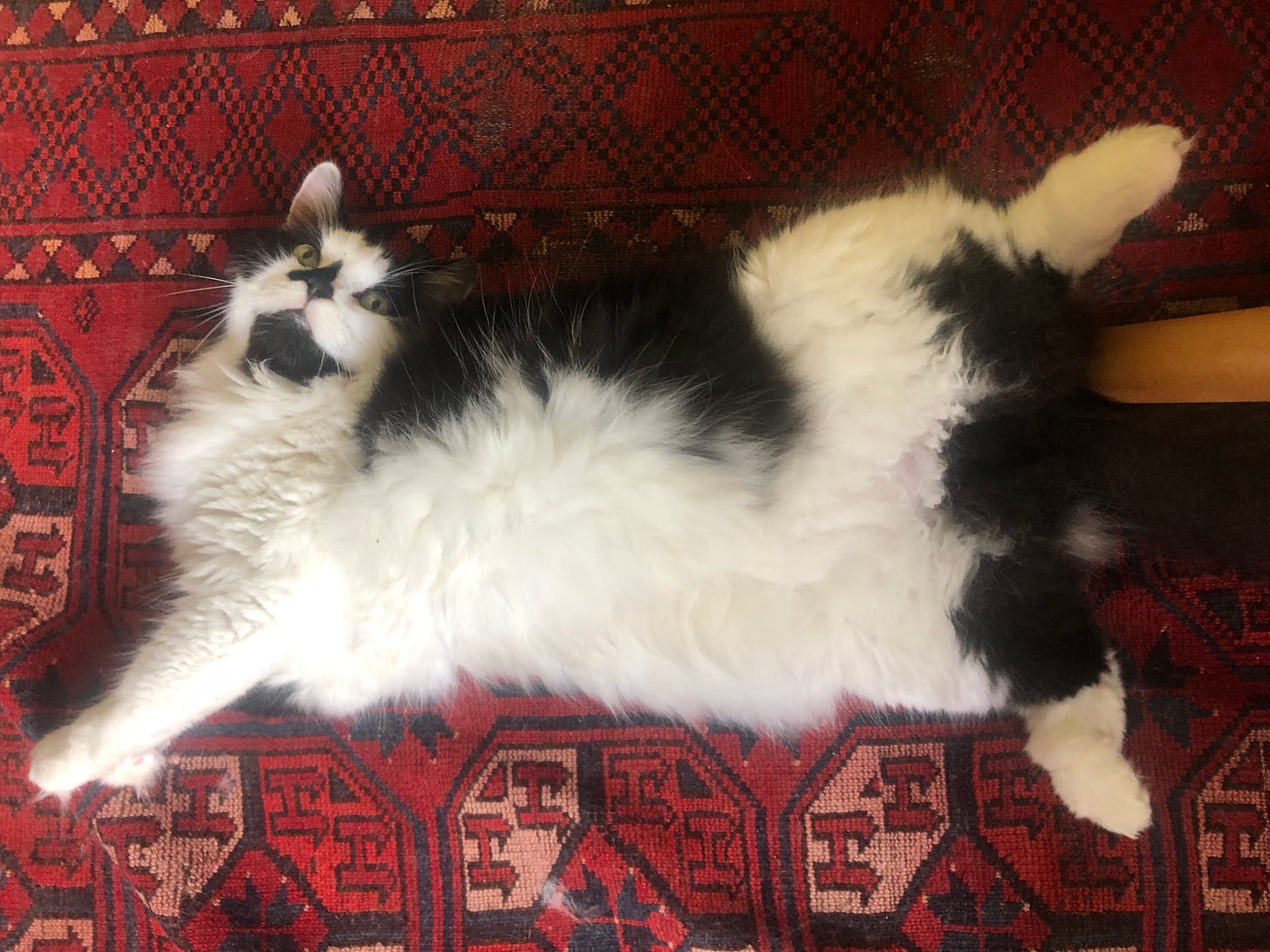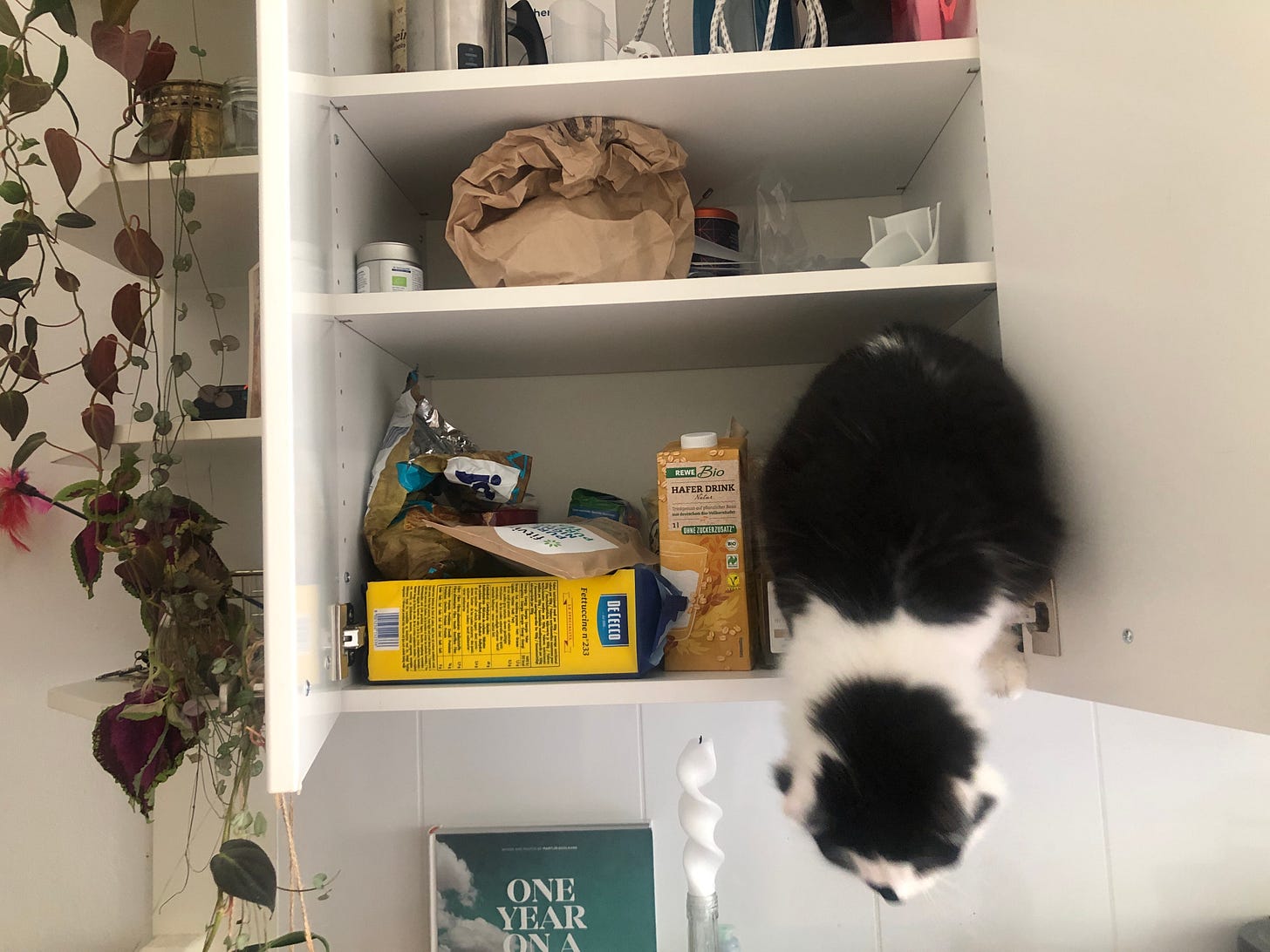Hi friends—
Can we talk about boundaries? Do you have them? Are you comfortable with them? If you’ve had to do the hard work of learning them as an adult–friend, I see you. I hug you. I support you.
It. Is. So. Hard.
This is a text message I just sent my friend Caitlin while asking her advice on a boundary I needed to set:
Once we’d worked it out, she made sure I was OK with it:
I do hate it. I find it loathsome. But I need to do it for my relationship with myself, which is the baseline for my relationships with all others.
If you’re like me, maybe you didn’t grow up learning that personal boundaries were a thing to be valued. Truly, I didn’t know what they were until just a few years ago; that applied to my own, sure, but also extended to others’. I didn’t comprehend personal space—mine, or others—and that resulted in many years of codependent relationships, rooted in a lack of personal agency and self-worth.
Boundaries have been the cornerstone of building my self-worth and dignity. Many of them are now non-negotiable (for me, that sounds like the voice of my personal representative who pipes up in my head going, “I’m sorry, but that is not acceptable to my client”) but every time I encounter a new one, I have a meltdown. It takes many tries before I eventually learn to feel comfortable with setting it.
It amazes me when I see people who know how to set them by default. My boyfriend, it so happens, is one of those people.
The other day, I witnessed a fascinating encounter between him and the man who came to install my dishwasher, whose manner was rude and hostile from the outset. My boyfriend entertained it for approximately 90 seconds before he asked him straight out, “Are you in a bad mood or something?” The man immediately lightened up—because people tend to respond very well to people who have self-respect.
“Wow–what’s that like?” I marveled—not so much at the self-respect part, per se; but the ability to immediately call out bad behaviour when he sees it, by recognising it as someone else’s problem.
I relayed the anecdote to several friends, who all had the same reaction as me: “Must be nice,” and “Guess he’s never experienced abuse.” We compared, with great humour and camaraderie, our own default responses to being spoken to rudely—panicking, “Oh no, did I do something wrong?”, and immediately devolving into emotional waitresses, falling over ourselves trying to placate and cater to said rude person.
I’m happy to report that I’ve evolved past contortionist people-pleasing now (there is a whole other post in that, though); I can now recognise and call out misplaced hostility, emotional manipulation, and gaslighting, but I don’t know if I’ll ever evolve to the point where my trauma responses are not at least triggered before I self-correct. Unlike my boyfriend, whose default response is, “What are you doing”—placing accountability squarely on the other person—I often have to remind myself that mutual respect is a minimum expectation I am entitled to.
Healing and being healthy is constant, exhaustingly non-linear work. That in itself is a gift: the ongoing nature of it has enabled me to develop tools that allow me to recalibrate, again and again, whenever I need it. As Caitlin (she, of all the good advice and wisdom—if you haven’t checked out her podcast yet, I insist) so beautifully put it the other day, “Stillness requires constant movement”—being OK is such a nuanced effort that involves so many tiny moving parts that need managing on an ongoing basis.
It’s a gift that keeps on giving; as well as helping me to bounce back time and again, it has made me extremely good at the work of helping others do the same. Healing and finding my truth, and helping other people heal and find theirs, is an ability I’ve earned and feel proud of.
However, the non-linearity makes it unendingly uncomfortable work—and the kicker is that when you think you’re in a good place is exactly when you’re ready to be taken out again. As we level up, we’re leveled out; I’m at the point where I comprehend this, even embrace it, but am nonetheless dismayed every time.
I was thinking the other day about how we’re forced to evolve from conception; even before birth, them’s the rules: when you’re done growing in your environment, you’re out. We come into this world being kicked out of our comfort zones—that’s the natural order of things. We’re not supposed to stay comfortable. Don’t look at me—it’s science.
In other news, I’m very socially awkward.
People generally seem surprised to learn this about me—I guess because I’ve learned to be good at hiding it. You probably don’t notice it because I’m trying very hard to make you feel comfortable.
To be very clear, my brand of social awkwardness is one where only I feel awkward; I want it to be as minimally an awkward experience for you as possible. (Did I say I was done being a contortionist people pleaser? Heh.)
As boring and unstimulating as the lockdown was, it was also a respite from social anxiety. When I started going out again, I found comfort in a straw bucket hat that, while cute, also felt insulating; I enjoyed the feeling of hiding while being outside.
The effect was unfortunately limited, because apparently the hat obscures so much of my face that people had trouble recognising me, and I was forced to adopt an absurd habit of doffing my hat like some confused, time-traveling Victorian gentleman.
As the hat might suggest, I’m a hermit crab (or, more accurately, a crabby hermit). An archetypal introvert, I can happily spend many days alone without the need for company, and my solitary habits are generally very healthy.
Notably, I hardly drank at all during the long (long, long, long, Jesus it was long) winter—which has made it all the more noticeable that, since lockdown ended, I’ve been drinking considerably more than usual. So much more, in fact, that I’ve felt compelled to address it.
I decided to give myself a “consciousness break” (that’s a term I just made up for time dedicated to paying attention to things I might be avoiding or ignoring). It was immediately effective; by making a conscious decision not to drink, I’ve had the opportunity to observe the space between impulse and decision, and unpack why I drink when I drink. Unsurprisingly, perhaps, it’s mostly a response to anxiety.
Recognising it as a coping mechanism has helped me to make decisions differently. For example, the first thing that happened was that I began declining group social events that would require engaging with people I don’t know well; knowing I wouldn’t be drinking, I also knew immediately that I wouldn’t be able to cope in a situation where I didn’t feel comfortable by default. In doing so, I recognise that I’m putting my comfort first, which I’m very happy about.
“Comfort” has emerged as a keyword during this process. When I realised that I look for coping mechanisms for discomfort, I was forced to acknowledge that I’m fundamentally uncomfortable. I think that’s true of many of us; we learn to live with the things that don’t feel right in our soul—like that feeling of walking around looking like everything is fine while somewhere, deep inside our shoe, our sock is sliding off.1
When I stopped drinking, I made the unpleasant discovery that many of the feelings that I associated with a hangover—guilt, anxiety, shame, heaviness—are equally present in sobriety. What am I guilty/anxious about, ashamed of, weighed down by? So has begun a new chapter of my work, in which I investigate a disquiet—a dis-ease—in my spirit.
I welcomed it, and the lessons are coming thick and fast. This weekend, I woke up and stayed laying in my bed for a while, staring at my ceiling. Something isn’t working, I—or some other voice in my soul—said. While the feeling that accompanied it was heavy, weighing me down in my bed, it also felt, distinctly, like relief; a new beginning.
These are the moments I wait for—the inevitable reckoning of self with soul, calling me into integrity and alignment. It usually happens when I’ve run myself into a wall, which is why I don’t sweat it too much when I’m not getting where I want to be as fast as I’d like. What is meant for us is inevitable; it will find us, one way or another, even if that’s face-down on the floor (that is usually where it finds me).
I’ve also realised that I need to be ready to receive it—I believe with my entire being that we cannot release what isn’t serving us, in order to make room for what does, a moment before we’re ready to.
On Sunday morning, I was finally ready. I made a list of all the things that nourish me—and then made a counter-list of the things that do the opposite. I took the top three items on the second list and made a decision then and there to cut them out—all of these are things that overstimulate me and create noise that drowns me out. I’m cutting them out so I can hear myself.
If this sounds nice… it’s not. It’s usually painful, and deeply inconvenient. And it’s exactly why we need to really be ready for what we need, because what we need doesn’t arrive to us neatly packaged and easy to receive; it arrives like a wrecking machine that takes out everything that’s in its way.
We can expect to lose things that keep us comfortable and don’t serve our highest good; things that we like, and are attached to, but are inextricably linked to a version of ourselves that’s stuck.
I started reading a book this week by the transcendentally wise Iyanla Vanzant. I loved this passage:
I lost the mind that had kept me in denial for the better part of my life. I lost the mind that was so full of distortions, half-truths, and the ideas of others that it fed my misery like a ravenous dog. I lost the mind that was angry at my mother, hated my father, resented my brother, wanted to control everything and everybody in its midst that could in any way hurt me. At the time, I didn’t realize what was going on. I thought I was having a string of bad luck. As I watched my life fall to pieces, I did what any mindless person would do. I got totally pissed off! It is called temporary insanity. - Iyanla Vanzant
Who on Earth would voluntarily invite their life to fall to pieces? Only one who’s ready to get off their BS. From time to time, I get frankly sick of my shit—the stuff I keep doing again and again that clearly isn’t working. I’m pretty sure that’s where the shame and the guilt come from: on some level, I know I’m out of alignment with my best self.
I know I could be doing better. That knowing is the beeping of my inner wisdom aka BS-meter; if I ignore it long enough, it turns into this. I’m sure you understand, I can’t have that–so I’ll opt for spending this week (or however long it takes) voluntarily being, as Ms. Vanzant said, pissed off and temporarily insane until I’m carried to the other side of it.
Things that helped
“The biggest flex”
I adored this post about Simone Biles’ aspirational leadership. If we’re not using our platforms to advance others alongside ourselves, then what are we doing?
This word about communal narcissists
Speaking of boundaries… this is a worthwhile read. Protect your energies, sensitive friends!
Sorbet nails
I destroyed (destroyed, I tell you) my nails with accidental gels (a result of miscommunication, something you never want in the salon) so for the remainder of the summer my nails will be recovering under a coat of this cute, zingy shade. Pray for my keratin.
An evening lake trip
We got chased away by mosquitoes and ghosts (ask me later), but look how pretty.
Beautiful, wise, empowered women
I so enjoyed this chat between Luvvie Ajayi Jones and Liz Gilbert (a recommendation from the Podcast Mother, Caitlin). So much wisdom, so many reality checks. Prepare to be (very lovingly) called out.
Happy skin
I mentioned this product a couple of newsletters ago—I just started pairing it with this and my face has never looked or felt so fresh to death. A perfect morning regimen (don’t forget to add moisturiser and SPF—hydrate and protecc, my loves!).
High on the Hog
This beautifully-made and deeply emotional show is about food, but really it’s about history, and culture, and identity. It educates us about so much we should know about Black history that we don’t learn at school, and so much about Black culture that’s co-opted and erased. Four episodes wasn’t nearly enough.
Conscious entrepreneurs
I think it took me a full week to consume this conversation because I had to keep rewinding, relistening, and digesting. The podcast (which I have shared before, yes) is usually about dating but this episode focused more on business and living (I loved the 30/70 principle). A good listen for entrepreneurs (I know there are many among you).
Cold noodles
When I grew up in Japan I subsisted all summer long on hiyashi-chūka, an intensely delicious cold noodle dish. I’ve yet to find it in Berlin, so I kinda-sorta recreated (/bastardised) it with buckwheat spaghetti and a homemade sesame dressing. I followed this recipe, and served with avocado, cucumber and spring onions. (I’m thinking about making the dressing creamy by blending it with avocado—will report back.)2 Extremely delish and sappari, a lip-smackingly awesome Japanese word for “refreshing”.
This Isley Brothers remix
Plz enjoy (perhaps while preparing cold nudelz):
Cats that helped this week
My son.
…Also my son, moments after he was caught snacking on tortilla chips in a damn cupboard 😑
My daughter, on her way to sweetly sliding off the chair in her sleep as I stood by, camera in hand, waiting for it to happen.
I usually like to sign off with a bon mot, but all of my energy today is going into staying upright and functional. I’ll leave you here so I can tend to my spirit, which is quite frankly taking a battering, and hope I have some good words for you next time :)
✌️ 🏳️,
This is from one of my favourite memes that, as far as I know, is uncredited. If anyone knows the source, please let me know so I can cite the creator!
I did this, it’s gross. Don’t do it.












